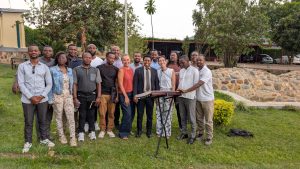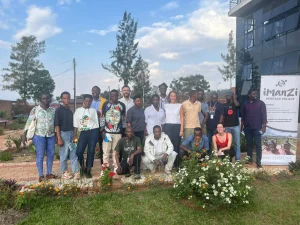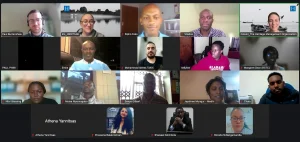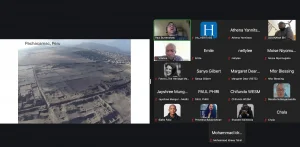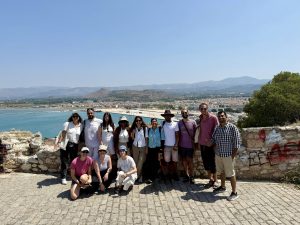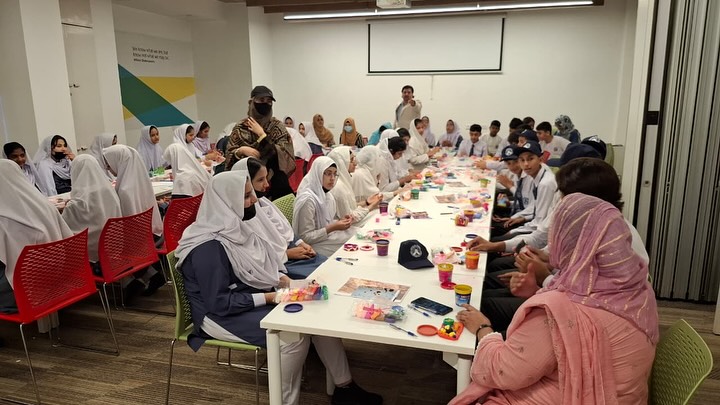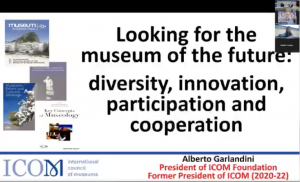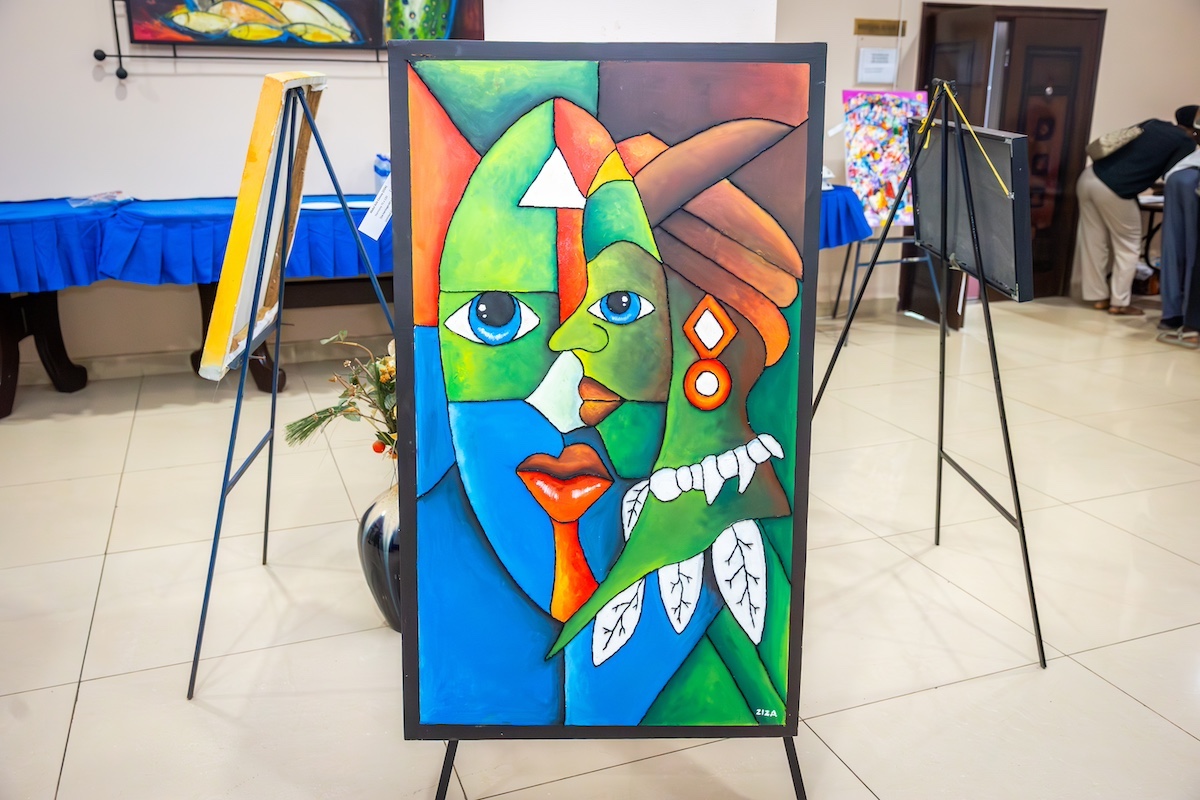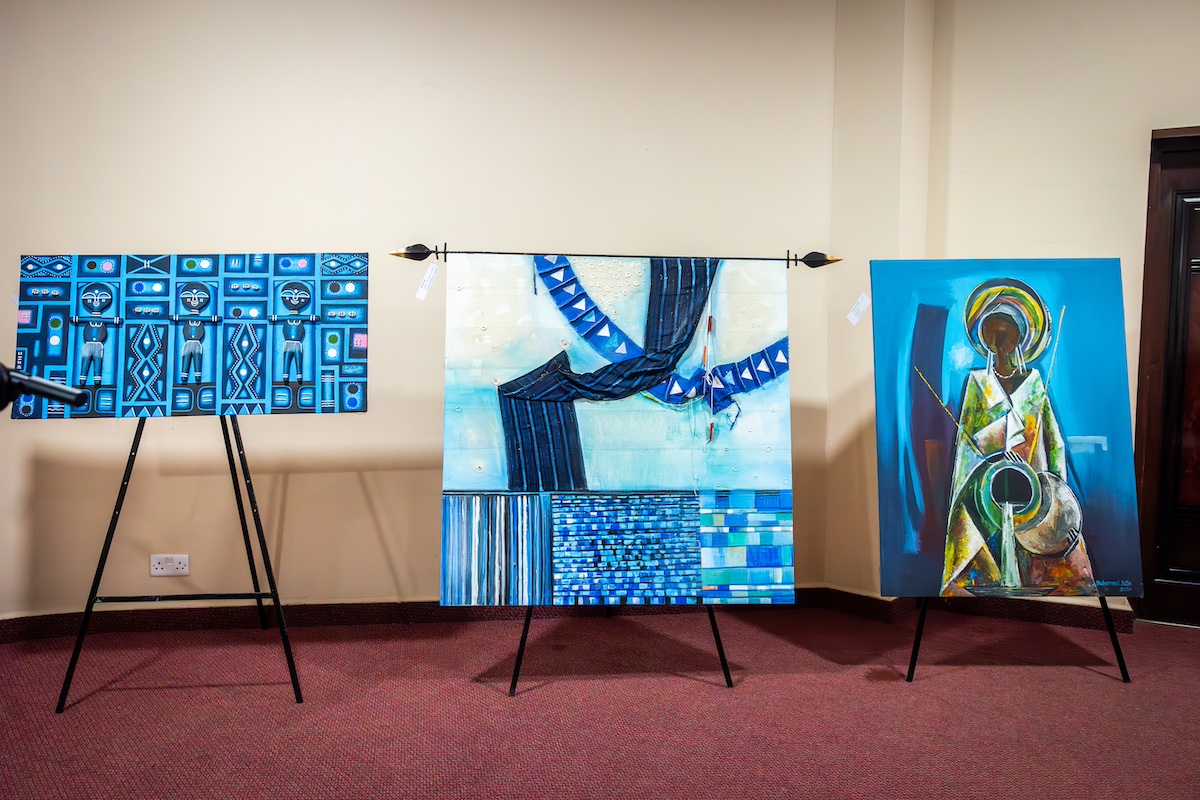: Workshops
From Nyamasheke to Kigali: Empowering Communities Through Cultural Heritage in Rwanda
By Eirini Oikonomidi, Rwanda Projects Manager
During the recent, nearly month-long visit to Rwanda, two successful and highly engaged workshops were conducted under the theme: “Engaging Communities in Cultural Heritage.” The training gathered 37 heritage practitioners who offered valuable insights, exchanged knowledge, and shared on-the-ground experience.
The workshops were led by Lena Stefanou and Aris Anagnostopoulos, whose expertise guided participants through practical strategies for community involvement.
The first workshop took place in the southwestern region of Rwanda, in Nyamasheke. This location was strategically chosen because the area is considerably more remote from Kigali, marking a significant step in expanding our programme’s on-site presence. Partnering with IVOMO, who provided crucial organisation and coordination support, the workshop focused intensely on local needs and specific challenges faced by communities in the Great Lakes region. The week spent in this tropical landscape underscored the importance of reaching remote areas to ensure a broad national impact.
Following the Nyamasheke session, the second workshop was hosted in Kigali, the capital of the country. This session broadened the discussion to encompass a wider range of stakeholders, organisations, and dynamic national applications. Our essential partner, the Rwanda Cultural Heritage Academy (RCHA), as always, provided excellent logistical support, including the necessary room and materials at the Kandt House Museum.
Ultimately, both intensive workshops provided fertile ground for the exchange of knowledge, the development of strategies, and the reinforcement of the role of local communities in the protection, preservation, and utilisation of cultural heritage as a driver for sustainable development.
Field Visits and Strategic Engagement
Following the successful completion of the workshops, the remaining weeks of the mission were dedicated to crucial field visits and high-level stakeholder meetings across Rwanda. As the Country Manager, I embarked on an extensive schedule to personally visit projects on the ground, covering a significant geographical expanse—from the tranquil shores of Lake Kivu in the west, across to the Ngoma District in the east, and down into the Southern Province.
This commitment to comprehensive on-the-ground presence yielded two vital outcomes for both our organisation and our local partners.
First, for me, the visits provided a vastly improved and granular understanding of the actual situation. Observing the projects firsthand allowed me to gain immediate clarity on their evolution, their current state, the specific difficulties local teams face, and their overall trajectory. This practical insight is indispensable for effective strategic planning.
Second, the impact on our local partners and the communities themselves was equally profound. By prioritising this on-site presence, we achieved a deeper connection that served to empower the local teams significantly. Our physical presence demonstrated a genuine interest and commitment, signaling the high value we place on their efforts and achievements. We had the opportunity to meet the dedicated individuals face-to-face, fostering stronger personal and professional relationships that reinforce the communities’ sense of ownership and dedication to the long-term sustainability of their cultural heritage work.
In short, these field visits transformed our theoretical understanding into tangible knowledge, strengthening both our project oversight and the foundational local partnerships necessary for lasting impact in Rwanda.
HERITΛGE Workshop on Community and Economic Development
HERITΛGE recently hosted an online workshop on Community and Economic Development, bringing together 20 heritage managers from 16 countries across Africa and Asia. The three-day intensive training aimed to strengthen participants’ understanding of how cultural heritage can be mobilised for sustainable economic benefit while supporting community development.
The programme was designed to provide heritage managers worldwide with a firm understanding of the motivations for mobilising cultural resources for economic benefit, the limits of that mobilisation, different strategies for creating economic benefits, and how economic impacts are measured and communicated. Participants were guided through the process of developing plans for their own case studies, including goal setting, strategy selection, assessing economic feasibility, and establishing monitoring and evaluation procedures.
The workshop was led by Dr Paul Burtenshaw and Athena Yannitsas. Dr Burtenshaw is a specialist in heritage economics, heritage tourism, and the relationship between cultural heritage and sustainable community development. He has worked on heritage and tourism projects in a range of countries, focusing on how economic approaches can support long-term preservation and local benefit. Athena Yannitsas, Intercultural Initiatives Manager at HERITΛGE, works on programme development, training facilitation, and cross-cultural collaboration. Her work helps align HERITΛGE’s activities with the cultural contexts of diverse communities. Together, they guided participants through a structured and practical learning process linking economic concepts with real-world application.
The Tutor’s approach to stimulate “Thinking outside the box” ideas among participants to brainstorm, identify, develop, scale-up and enhance economic resilience and profitability of the Cultural Heritage.
Paul Phiri / Executive Director at PAZESA Horticultural Community
In total, the course involved 18 capacity-building cases and 19 case studies across two continents, with participants representing a wide range of organisations from Afghanistan, Cameroon, Egypt, Ethiopia, Eswatini, Kenya, Lesotho, Malawi, Malaysia, Mauritius, Niger, Nigeria, Rwanda, South Africa, Uganda, and Zambia.
Throughout the workshop, participants examined how cultural heritage can serve as an economic asset while ensuring that local communities benefit directly. Sessions covered the main sources of income in heritage, such as public funding, donations, and commercialisation, and discussed approaches to integrating sustainability within these models. A particular focus was placed on addressing local needs and priorities, including job creation, cultural preservation, and youth engagement.
Participants also explored ways to generate economic impact through cultural tourism and artisan production, analysing both the opportunities and challenges of these approaches. Further sessions addressed business viability and sustainability, including market-driven product development, audience segmentation, and the five Ps of marketing. Practical exercises on costing and financial planning helped participants assess the feasibility of their proposed initiatives.
Paul was such a great instructor, got me thinking about many things, especially in skills development, capacity building and governance. Hearing his experiences enriched the course. The session on M&E is particularly something that I have struggled with and I have learnt to keep the tools simple and to invent my own to suit my projects.
Margaret Dear Kasande-Köbel / Crafts Manager at Rwenzori Sustainable Trade Centre Limited
The final part of the training focused on capacity building and long-term sustainability, highlighting the importance of developing skills and confidence within communities to manage heritage enterprises independently. The course concluded with a session on monitoring and evaluation, which covered how to design measurable indicators, track progress, and use data to improve project outcomes.
By the end of the workshop, participants had developed frameworks outlining their project goals, strategies, and measures of success, supporting the implementation of sustainable economic development initiatives in their respective contexts.
For more information about HERITΛGE’s workshops, go to our open courses page, or follow us on Facebook, Twitter / X, LinkedIn or Instagram.
Digital Tools Summer School Programme
From 12th May to 18th June, HERITΛGE hosted its Digital Tools Summer School programme, bringing together 24 participants from Africa, Asia, and Europe.* The programme combined online and in-person training and equipped heritage professionals with practical skills in GIS, photogrammetry, 3D modelling, and terrestrial laser scanning.
From 12 May – 6 June the trainees took part in an online Training Program, while from 8 – 18 June those attending the Field School on the ground worked with trainer Cornelis Stahl in and around teh two of Nafplio, in the historic region of Argolida in Greece.
The Summer School engaged with 21 capacity building cases from across the globe, involving museums, universities, heritage organisations, and architectural firms. Institutions included the Khama III Memorial Museum in Botswana, the Uganda National Museum, the National Museums and Monuments of Zimbabwe, and the Ethiopian Heritage Authority, as well as international organisations such as UNESCO and the World Monuments Fund. Universities including Addis Ababa University, the University of Cologne, and the University of Lincoln also contributed to the knowledge exchange. These cases reflected a wide spectrum of heritage practice, from community-based hubs to global conservation bodies.
Geographic Information Systems (GIS)
The first module introduced Geographic Information Systems (GIS). Over two weeks, participants explored the use of open-source software QGIS to manage and analyse cultural heritage data. They learned how to source and style datasets, georeference manuscript maps, create new spatial data, and apply geoprocessing tools such as buffers and intersections. By the end of the module, each participant had produced a map tailored to their own heritage project, demonstrating their ability to use GIS to present and analyse spatial data.
Photogrammetry and 3D Modelling
The second module focused on photogrammetry. In a week and a half, participants developed skills in image-based 3D reconstruction, creating orthophotos and point clouds using Agisoft Metashape Professional. Combining photography, computer vision, and GIS, they produced 3D models that will aid in heritage documentation, monitoring, and communication. This workflow allowed participants to cover the full cycle from image acquisition through data processing to model publishing.
On-site 3D Documentation
For those attending in person in Greece, the Summer School expanded into hands-on training with UAVs and terrestrial laser scanning. Participants learned to operate drones for site documentation in line with European regulations and were introduced to different scanning technologies for generating detailed point clouds. Using open-source software such as CloudCompare, they processed their data to create high-quality deliverables, including interactive 3D models and visualisations.
The group also visited six cultural locations in the Peloponnese, where they applied their skills in real-world conditions. These included Moni Metamorfosi and Mycenaean Graves at Asini, Ottoman fountains in Nafplio Old Town, the Old Windmill at Drepano, and the churches of Saint Konstantinos and Profit Elias. Fieldwork at these sites allowed participants to test both photogrammetry and laser scanning methods, and to see how these tools can support heritage documentation, preservation, and public engagement.
By the close of the Summer School, participants had developed a strong foundation in GIS, photogrammetry, and 3D documentation techniques. They left with practical tools to apply in their own contexts, from community-led heritage initiatives to national museums and academic institutions. Just as importantly, they joined a global network of peers committed to safeguarding cultural heritage across continents.
Read more about HERITΛGE’s summer schools here.
*Botswana, Egypt, Ethiopia, Greece, India, Kenya, Italy, Lebanon, Palestine, Romania, South Africa, Tanzania, Turkey, Uganda, Yemen, and Zimbabwe.
Celebrating Cultural Heritage in Lahore
In August 2025, Lahore hosted two events that celebrated Pakistan’s rich heritage and explored innovative approaches to its preservation with the participation of our Preservation of Buddhist Rock Reliefs in the Swat Valley project.
At the British Council Library in Lahore, school students from across the city took part in an interactive session designed to introduce them to the Gandhara civilisation and its artistic legacy. Organised under the project “Preservation of the Buddhist Rock Reliefs in the Swat Valley: Digital Documentation, First-Aid Conservation, and Climate Change Adaptation,” the initiative forms part of the British Council’s Cultural Protection Fund (CPF) and was implemented in collaboration with national and international partners, including the Directorate of Archaeology and Museums, Khyber Pakhtunkhwa, the Italian Archaeological Mission to Pakistan, The Heritage Management Organization, and Essanoor Associates.
During the session, students engaged in creative workshops that encouraged exploration of heritage, history, and environmental awareness. They painted tote bags inspired by Gandharan motifs and crafted clay replicas of artefacts. The programme successfully combined artistic expression with educational enrichment, fostering both appreciation and curiosity for cultural preservation.
On the same day, the Lahore Museum hosted an International Panel Discussion entitled “The Future Museum: Technology, Heritage Conservation, and Inclusive Innovation.” The event was supported by ICOM, UNESCO, Essanoor Associates, the Heritage Management Organization, and the Tourism, Archaeology and Museum Department, and featured experts including Dr. Cristina Mengazzi (UNESCO), Alberto Garlandini (ICOM Foundation), Ar. Kashif Essa, and Malik Magsood, with moderation by Zainab Sabri, the Museum Education Officer. The panel examined the evolving role of museums, highlighting how technological advancements, innovative curation strategies, and inclusive practices can make cultural institutions more accessible and sustainable. Discussions also addressed local challenges and opportunities, bridging international perspectives with Pakistan’s heritage context. Th recording is available on Lahore Museum’s Facebook page.
Both were fantastic initiatives which illustrated Lahore’s multi-faceted approach to cultural engagement, demonstrating how hands-on educational programmes for young learners can complement professional dialogues on innovation and preservation.
Training Artists, Telling Stories: HERITΛGE and VAAG Sign MoU in Banjul
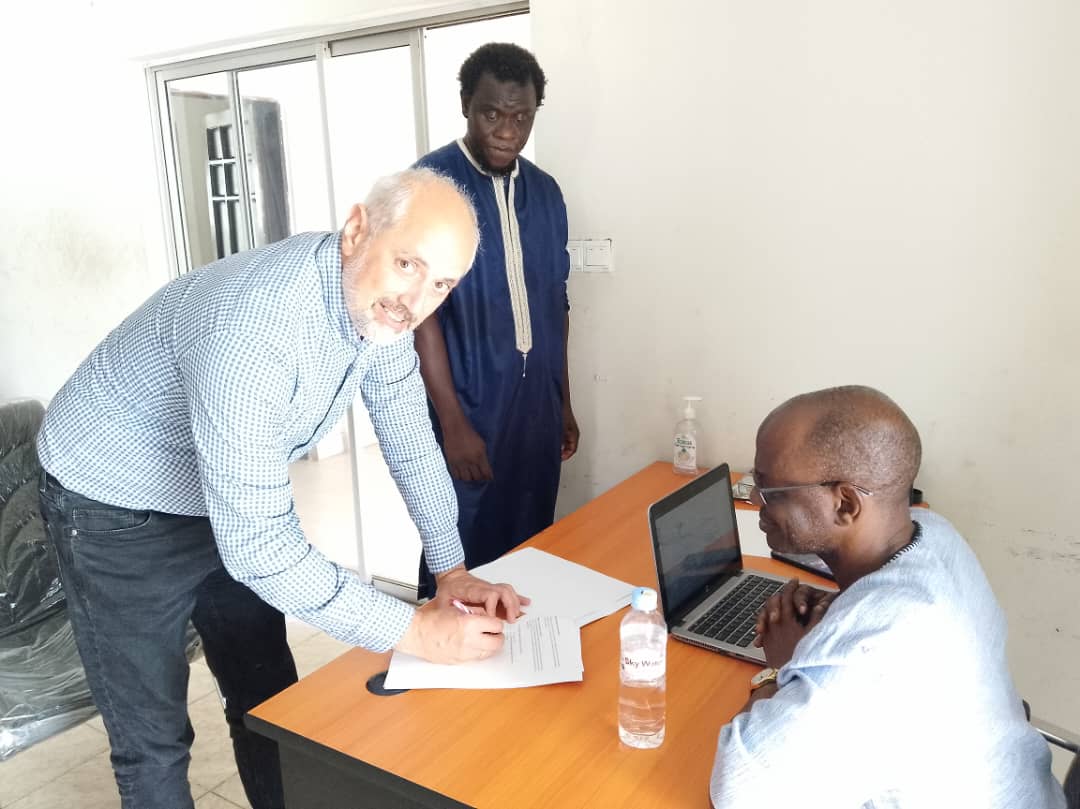 On Friday, July 18, The Heritage Management Organization (HERITΛGE) took another step forward in supporting The Gambia’s vibrant arts community by formalizing a partnership with the Visual Artist Association of The Gambia (VAAG) at the NCAC Pipeline Offices in Banjul.
On Friday, July 18, The Heritage Management Organization (HERITΛGE) took another step forward in supporting The Gambia’s vibrant arts community by formalizing a partnership with the Visual Artist Association of The Gambia (VAAG) at the NCAC Pipeline Offices in Banjul.
Dr. Evangelos Kyriakidis, Director of HERITΛGE, led a master class called “Telling Heritage Stories Through Art” for VAAG members. The session explored how visual art can become a bridge between past and present, helping communities preserve their stories while making them relevant for new generations.
The gathering drew important voices from The Gambia’s cultural landscape, including Mr. Hassoum Ceesay, Director General of the National Centre for Arts and Culture (NCAC), who emphasized the value of bringing together local institutions with international partners to strengthen heritage education.
By the end of the day, Mr. Modou Lamin Jatta, Chairman of VAAG, and Dr. Kyriakidis had signed a Memorandum of Understanding that opens doors for ongoing collaboration. The partnership promises more training opportunities, exhibition development, and chances for Gambian artists to share their heritage-inspired work with international audiences.
The collaboration is already showing results. This past February, VAAG organized a visual art exhibition during the HerMaP Gambia Certificate Award Ceremony, which marked The Gambia’s 60th Independence Anniversary. The exhibition showcased how contemporary artists are interpreting their nation’s story and contributing to conversations about identity and cultural memory.
HERITΛGE looks forward to continuing this work with VAAG and other local partners, creating spaces where heritage and creativity intersect. Together, they’re building platforms for artists to explore their history, connect with their communities, and imagine new possibilities for the future.
Summer Field School in Community Engagement for Cultural Heritage
This summer, HERITΛGE’s 11th Engaging Communities in Cultural Heritage Summer School brought together students, researchers and practitioners from around the world for two weeks of learning, discovery and collaboration. Through a range of activities, participants explored how communities engage with cultural heritage through a mix of academic sessions, practical fieldwork and creative activities.
The first week of the programme involved online teaching where participants were introduced to the ideas of engaging communities. Then, from June 23rd to July 6th, participants travelled to the Island of Paros where they were able to further explore what they had learned. Here is a look back at how it went.
Day 1: Mapping First Impressions
The in-person programme began in Paroikia, the island’s capital. After an introductory session, participants stepped out to create personal maps of the area using their senses as guides. In a group discussion, they shared first impressions and identified key questions to explore in the days ahead.
In the evening, the group travelled to Aliki to join the Klidonas midsummer festival. Music, dancing and lively conversation provided a first opportunity to connect with the local community and one another.
Day 2: Sensing the Island
Participants deepened their exploration by tuning into the sensory dimensions of Paroikia, focusing on its sounds, smells, textures and colours. Later, they collaborated on a collective mental map that reflected both individual and shared perspectives.
The day ended with a welcome dinner by the coast, accompanied by traditional music and conversation.
Day 3: Observation and Oral History Skills
Having become more familiar with the environment, participants focused on specific locations of interest, blending observation with active participation.
A hands on session introduced tools and techniques for conducting oral history interviews, with a focus on audio and video recording.
Day 4: Learning from the Locals
The group met with Spyros Mitrogiannis, a leading figure in local cultural work, who guided a visit to the Institute for Archaeology of Paros and the Cyclades. He shared insights into the cultural, environmental and political landscape of the island.
In the afternoon, participants examined themes such as ancient quarrying, fishing traditions and contemporary religious practices, laying the groundwork for their field research.
Day 5: Stories from Afar and At Home
Two guest speakers enriched the day’s programme. In the morning, Traci Kawai presented the Fisher Child project from Cape Town, a VR and AR exploration of sea, memory and healing.
In the evening, Katerina Konstantinou shared her research on folklore and local material culture, examining how heirlooms and souvenirs shape participatory documentation.
Between sessions, teams continued developing interview guides in preparation for community engagement.
Day 7: Walking the Paths of Heritage
In northern Paros, participants met Malatestas, President of Paros Park, who spoke about the challenges of heritage management and local involvement. A walk through the park’s trails highlighted the close ties between landscape and culture.
The day concluded with a beautiful sunset watched from the beach.
Day 8: Festivals and Tourism
The day focused on festivals as expressions of identity. Vicky Papadimitriou shared her experience with local, regional and national events, while Tim Healing offered case studies on community tourism and sustainability, prompting thoughtful discussion on responsible development.
Participants also used the day to refine their ongoing projects.
Day 9: Stories Set in Stone
The morning opened with discussions about interviews already carried out, ranging from fishing traditions to quarrying and religious offerings.
In the evening, Spyros Mitrogiannis led a visit to the Ancient Marble Quarries at Marathi, offering historical context and highlighting present day challenges around preservation.
Day 10: Visual Identity and Storytelling
Participants continued reviewing interview materials and shaping their group projects. In the afternoon, Irene Biza led a session on design and identity, exploring how visuals influence perceptions of place.
The day concluded with a screening of Yorgos of Kedros, a documentary that sparked reflection on storytelling and self representation.
Days 11 and 12: Final Preparations and Reflections
As the public presentations approached, teams worked to analyse ethnographic data and create podcasts, videos and visual materials.
Participants also attended a lecture by visual artist Natassa Biza, who offered new insights into ancient spolia around Paroikia, challenging conventional perceptions of historical remnants.
The final day was dedicated to collaboration, as teams prepared their presentations to the local communities and reflected on their shared journey.
Online Conference and Presentation
The field school concluded with the Online Engaging Communities Conference on Sunday, July 6th, where participants shared their insights and creative outputs with an international audience. This event was exclusively available to our trainees and alumni and included presentations and insights from the Summer Field School Alumni who shared their current research projects, sparking an engaging session enriched with thoughtful discussions and commentary.
Following the conclusion of the Conference, the trainees organized a presentation of their work that was open to the public and was widely attended. The presentation took place in the Dimitrokopoulos Building in Paroikia, with the kind support of the Municipality of Paros. During this second part of the evening, participants had the opportunity to share insights from our two weeks of fieldwork with attendees interested in their work.
“After days filled with collective challenges and individual discoveries, often marked by the initial confusion that is so characteristic of ethnographic research, this final presentation felt like both a validation of our efforts and an affirmation of our growing professional identities,” reflects trainee Claudia Valisano. “Beyond that, the event also had the potential to spark fresh interest among local residents in the island they call home, renewing awareness both for them and for us. Once all speeches were delivered and questions from the audience were addressed, guests were invited to enjoy food and drinks on the building’s beautiful terrace.”
You can find out more about our Summer School programmes and future dates here.

